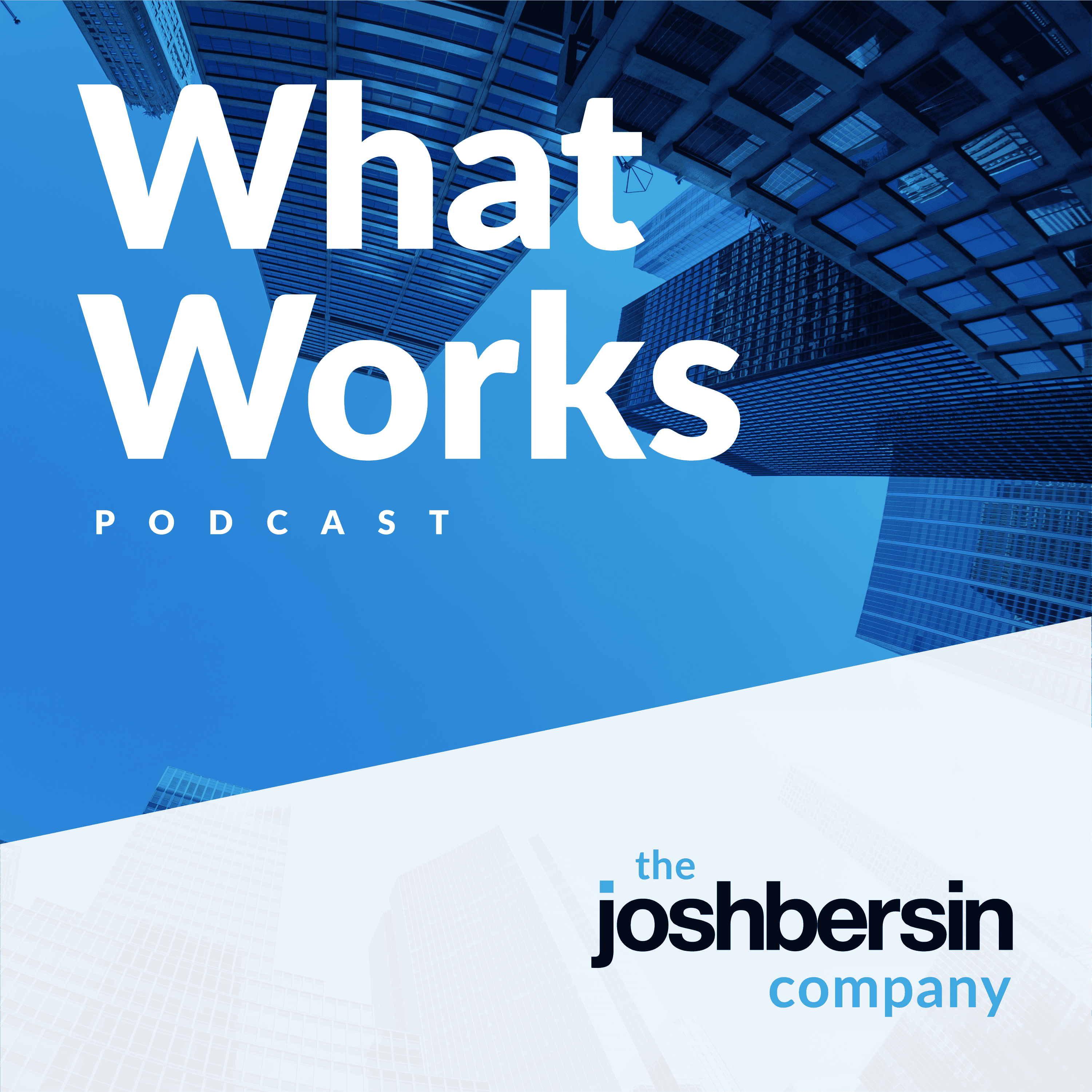Episode Transcript
Speaker 1 00:00:01 Hi, this is Josh person. Welcome to Research-Based Perspectives on the ever-Changing World of Work, leadership, learning, and HR with a heavy dose of insights on the exciting world of HR technology.
Speaker 1 00:00:27 Good morning everyone. Today I'd like to share some thoughts on leadership and what we can take away from the last four years of the Trump administration and today's results of the US presidential election. I think there's three big leadership lessons that we've learned here. The first is that leaders care. Now, several months ago, really around March or April, I wrote an article called CEO as Chief Empathy Officer. And the reason I wrote that is because what we were basically hearing from virtually every company was it in a period of time where employees are worried about their lives and their health, the company can't operate. So the idea of wellbeing and health and safety crawled out of the benefits department or the safety department and landed on the desk of the ceo. And that's a new, and to some degree enduring message about leaders because leaders have to take care of the people.
Speaker 1 00:01:19 Now, in the political sphere, one of the reasons I believe Trump lost the election is there was a fair consensus certainly amongst the people who voted for Biden, that he didn't really care about the health of each individual in the United States. I won't get into the issues of how many people died and what happened with the pandemic task force, but there's a general feeling of malaise in the United States, fatigue about the pandemic, and we want somebody who cares, not someone who ignores it. And that's true in business too. But one of the things that I think most of you know, but I'll just remind you, is that companies are made up of human beings. And so in a sense, as a business leader or a team leader, or even as a supervisor, you're in the job of being a great psychologist. You have to figure out what will motivate people to do amazing things for your customers and free internal stakeholders.
Speaker 1 00:02:11 And that means you have to give them a sense of safety because when people don't feel safe or they don't feel healthy, that's a distraction to their creative thinking or their services or their empathy or their communications to others. And so I think the number one lesson I learned from the Biden win is that leaders who care do win over leaders who don't. The second lesson that I think comes out of this episode of the last four years is the huge importance of trust. And there's no question that if you look at all the statistics from many, many sources in the United States in particular, but also in other countries, the UK people don't trust their institutions the way they did before. To some degree, I think this was Trump's strategy. The whole idea of the deep state was really to eliminate our trust in the political system so that he could remake it for his benefit.
Speaker 1 00:03:04 Well, he effectively did that. In fact, right now, if you look at the research just done six weeks ago by the Edelman Group, only 13% of Americans trust that the federal government knows what to do to eliminate the pandemic. I mean, that's just incredibly low. About 15% believe that the federal government knows what to do about global warming. And of course some people don't even agree that there is such a thing. On the topic of racial justice, it's about 18%. And on the topic of income inequality and wages, it's also below 20%. So more than 80% of Americans do not currently trust that the federal government, which is basically the umbrella organization for our social systems, will do what they need to do to fix the pandemic income and equality and wages, racial injustice and racial disparities or other forms of inequities and global warming.
Speaker 1 00:04:02 So where have they gone to get those problems solved? Because these are things that that affect our daily lives. We're all worried about our health, we're all worried about our incomes and our careers. We're all worried about our environment in my area. We had fires this year that had a very significant disruption on my life, and we're all worried to some degree on justice for whatever part of life that we feel is unjust. Well, they're going to you, they're going to corporations, they're going to the products and services that they buy. And so one of the things that comes out of the Edelman report is that close to 70, greater than 70% of millennials, and it's close to 70% for most people, are now asking their product and solution providers, the companies they buy from to be trusted institutions. They will not buy products and services from companies that are not taking care of the environment, paying fair wages, operating in a safe and healthy way, and taking care of and being a racially and inclusive and just organization.
Speaker 1 00:05:02 So that's a pretty important message and maybe I can thank Donald Trump for creating that situation, but it's certainly making business leaders stand up taller than ever and taking responsibility. Now, how do you really create trust? There's a lot to it, but as I discussed in a couple of articles this year, let me remind you, there's basically three things that create trust. The first is competence. And for us in hr, competence means doing our job well and iterating on it when it's not done well. Cuz nothing's ever perfect and it certainly means training people. It means slowing down to talk about mistakes. It means giving people a sense of psychological safety so that they can point out errors and we're not continuing to do things that aren't being done in the best way. And it means being a competent person. Now, in the federal sphere, it's not clear to me if that was one of the criteria for the Trump administration.
Speaker 1 00:05:59 You know, when you look at the post office and dozens of other programs in the federal bureaucracy this year, I don't think competence was the number one goal. I think it was political power and influence. The second part of trust is ethics. Ethics basically means fairness, equality, transparency, and a sense of justice in the organization. If someone's making more money than you are, you kind of want to know why. What is it about them that I can aspire to so I can make more money If one person gets hired versus someone else? Again, what's the criteria for that hire? If someone gets a new job or promoted, how come I didn't get that new job or get promoted? <laugh>, I mean these are very, very common daily things that happen at work. And so transparency and diversity and inclusion programs are really there to make sure that this sense of trust exists.
Speaker 1 00:06:53 You know, if we let the business world become as political as the political world, but people aren't gonna be operating very efficiently and they're just gonna be distracted with worries about what's gonna happen next to them. The third area of trust is voice, is listening, is paying attention. And all year this year, I know you have done an incredible job of listening to employees, having town halls, having CEOs and all of your business leaders available for people doing surveys and really understanding what's on people's minds. That creates a sense of trust and also a sense of psychological safety that when people speak up, we're going to listen and we're going to respond and they won't be penalized for pointing out something that may be a problem that has to be addressed. And in the political sphere, I think there was a lack of that in a significant way.
Speaker 1 00:07:44 And I think that's one of the other reasons that a lot of people may have voted for Biden. The third issue I want to bring up about leadership that I think becomes clear from the election is this idea of followership. Now I've read probably a hundred books on leadership and talked to many hundreds of you and companies and certainly gone through my own leadership journey. And one of the quotes I will never forget was from Colin Powell, who was a very highly esteemed leader despite what happened in the Iraq war. And what he said is that great leaders have followers. In other words, your role as a leader, supervisor, manager, executive is to create an environment and experience where people want to follow you. Now you can do that in any way you want. Some leaders are very enthusiastic, some are very smart, some are very strategic, some are very persuasive.
Speaker 1 00:08:34 I mean, you can read book after book about CEOs of different companies and see what it was about them that created a sense of followership. But I would encourage you in your leadership assessment, leadership development, leadership discussions to remind people that just being the boss does not make you a leader. And in many respects, that was really what happened to Donald Trump. I get the sense that his style of leadership is it's my way or the highway. And the turnover and the ranker that took place in the White House and in the federal government during his administration is evidence of that. On the other hand, leaders that create a sense of teamwork and followership have scale. The ultimate issue you have as a leader is scale. In fact, for most of us when we become managers or supervisors or leaders, the big awakening is that for the first time in your career, your success is dependent on the success of others.
Speaker 1 00:09:33 And if these other people feel motivated and empowered and trained and facilitated to succeed, you will succeed. And that is what followship is all about. It's about creating an environment that's good for the people around you so that they can succeed at their jobs. In fact, one of the things I've concluded in my own career and certainly talked to you, many of you about this, is during a time of disruption like this year with the pandemic individuals, human beings are the most resilient things in the world. We will pick ourselves up if we fall down, we will come up with new ideas, we will invent, we will adapt, we will create, we will come up with new ways to solve problems if we are given the opportunity. And so in many ways, the role of a leader is not to tell people what to do or reprimand them or judge them for that matter.
Speaker 1 00:10:27 It is to give them the opportunity to do the God-given thing that we do as human beings, which is to adapt. And when you do that, you create followers because all the individuals working for you feel empowered to succeed in their lives. And in turn, you can succeed as a leader. You know, there's a lot of lessons to learn about the last four years in the United States. And in addition to these, I would add one more, and that is that being a great politician does not require that you are a great leader. It simply requires that you get a lot of people to vote for you. And the problem that I think we face in a lot of the political environment is that we elect a lot of people who are popular and do a great job of creating an environment that we like and then they don't always do what we hope.
Speaker 1 00:11:17 Now, I'm not gonna spend a lot of time talking about politics. I certainly don't claim to be an expert, but I think the business community, we have the same issue. Let me tell you a story. Two years ago I was in Finland meeting with several of the biggest companies in Finland. I met with one of the largest elevator companies in the world. I met with one of the largest food product companies in dairy companies in the world, and several other companies over there. And I was incredibly impressed with the quality of their hr, the depth of their thinking of their business strategies, the quality of their products and services, the level of engagement and passion they had. But the one thing that was amazing about all of the companies I visited, cuz we talked about leadership a lot, was that they all told me that the CEO is not the most famous person in the company.
Speaker 1 00:12:04 In fact, many of them told me that the CEO is actually behind the scenes and really more of an operator and less of a celebrity and that in that country and they make good money, but they're not making nearly as much money as they do in the United States. The executive leadership or leadership role is one of supporting others. And these finished companies are incredibly high performing companies. And I think that's a role model to some degree for us. Now, every leader leads in different ways, and certainly it takes a big ego to be a CEO and sometimes they are personalities and they want to be popular and that's fine. But I think underneath that, the idea that your job is to care, create, trust, and develop a sense of followership in the organization are the three things that I walk away with from this election.
Speaker 1 00:12:52 One more final point, 2021, I believe 2021 is framing up to be one of the most exciting explosive years in the economy and in our economic and business lives. We've been through an entire year of being locked in, prohibited from traveling, not seeing our family and friends, not doing the things we like to do in our communities. We've had a lot of political upheaval in the United States, and of course a lot of you have lost jobs or lost income because of the pandemic. Think about what happened in the 1920s when the viruses finally extinguished and we have a vaccine that we feel safe using, which may be six to nine months. Yet you're gonna see an unleash of economic power and enthusiasm and growth like we have never seen before. So my suggestion for the year ahead this year has been a year of transformation, of creating a safe workplace, which I'll talk more about in the next podcast of building a more empathetic set of leaders on re-skilling everybody in every role in the company in a massive way and about creating a sense of wellbeing and belonging and purpose in the organization.
Speaker 1 00:14:03 Next year, get ready for some really fun times because I think we're gonna come out of this pandemic with an explosive growth and a very, very exciting time. Stay tuned. Of course, I'll be watching all the data I can every day and try to share as much as I can with you. And as always, I really welcome your feedback. I am not trying to take any political positions on this podcast. Just try and reflect on what we've learned this year and put it into terms of something that I hope you can use in your organization. Thank you.


